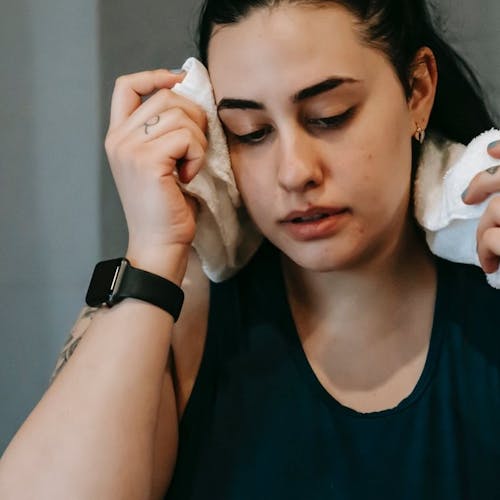This website uses cookies to enhance the user experience. By using Yoppie you are agreeing to our use of cookies.
Menstrual Cycle Slumber: 6 Ways Your Period Can Affect Your Sleep
Written by Yoppie
24 Jul 2020
Sleepless in... PMS
SOS, REM!
Elevated Estrogen
Problematic PMDD
Feeling hot, hot, hot
Struggling to catch those Zzz’s? There are so many lifestyle factors and other health conditions that define our sleeping patterns, but for women, the menstrual cycle can be one of the most affecting elements of a good night’s rest. Here, we’re breaking down the ways your period could be keeping you up at night, and what you can do about it.
Sleepless in... PMS
PMS never stops bringing the fun during our cycle, and by fun, we mean irritation, frustration, and heightened anxiety. Turns out PMS could also be to blame for our tossing and turning. According to the Sleep Health Foundation, 7 in 10 women claim their sleep pattern changes before their period, with the most common times being 3-6 days before.
In 2018, a study found that women who suffered with PMS had the poorest sleep quality, and this is thought to be because it is around this time that progesterone levels are lower. Progesterone’s role is to get the body ready for a pregnancy, so it tends to rise after ovulation and dip closer to your period. Some women even experience such negative PMS symptoms that it leads to insomnia.
What to do about it: If your period is keeping you up at night, counteract this by getting to bed a little earlier the week before your period, to prepare your body and get some extra hours of rest.
Crappy crampy sleep
Though hormones are usually to blame for all this bad sleep, sometimes it’s simply the monthly cramps and other symptoms that are directly affecting our slumber.
The Sleep Foundation states that menstrual problems like cramps, bloating, headaches, heavy bleeding, and pain can come with sleep problems because of these external discomforts. Just as anyone would experience sleep disturbances if they had severe cramps in any other body part, some women struggle to fall asleep with the constant cramping in their uterus - understandable, really.
What to do about it: Take a hot water bottle to bed, and make use of over-the-counter pain medications like paracetamol or ibuprofen to ease cramps and other nightly pains that could be keeping you awake. Don’t suffer all night long when you could numb the pain and enjoy a few more hours of shut-eye.
SOS, REM!
REM sleep (known as Rapid Eye Movement sleep) is the phase where we begin to dream, and we get the deepest, most restful sleep. It’s incredibly restorative for both the body and the brain, so too much disruption to REM sleep means you will feel less rested in the morning. Studies have linked excessive PMS symptoms with a reduction in the amount of REM sleep women are able to experience, so it’s really no wonder we can wake up feeling knackered.
What to do about it: If you know you will struggle to focus during the day while on your period due to lack of sleep, try to plan your non-important tasks for these days so you can relax a little - nothing too technical, physical or stressful!
Elevated Estrogen
Straight after your period, you may notice you enjoy a few decent nights of sleep. Score! This is the time in your cycle when your body is more likely to respond to the melatonin found in your body - the hormone that sends us to sleep. After this phase comes a rise in estrogen levels which, you guessed it, affects our sleep once again. No rest for the menstruating! This is also the reason that one of the most effective treatments for PMS symptoms is taking the combined contraceptive pill, which can stop you from ovulating, and do away with this troublesome hormone fluctuations!
What to do about it: Keep a sleep diary (recommended for at least 3 months) to figure out which points during your cycle you are struggling to sleep. By having a diary of past sleep disturbances, you can create a calendar that predicts when this will happen in future.
Problematic PMDD
Premenstrual dysphoric disorder (PMDD) is a more serious form of PMS which can bring about severe depression and anxiety. In these cases, the body can sometimes have a lesser response to melatonin in the body when in the luteal phase, which can lead to reduced quality of sleep. And we all know how that goes; less sleep puts us in a bad mood, the bad mood affects our sleep, and the cycle continues.
What to do about it: PMDD is a condition that is best discussed with a doctor to figure out the best treatment options, so if you are talking to your GP about this, be sure to bring up any sleep issues so they can help.
Feeling hot, hot, hot
Your ‘basal body temperature’ is described as the lowest body temperature attained during rest, and during certain phases of your menstrual cycle (*ahem* thanks ovulation!) the base level can change. This happens because, as the body prepares to release an egg during ovulation, body temperature decreases. Once the egg is released, progesterone levels rise sharply which increases the basal body temperature.
The Sleep Foundation says that our core temperature rises by around half a degree, which may not seem like a lot, but if you have ever tried to sleep in summer heat or you experience night sweats, you’ll know why this can become troublesome.
What to do about it: Keep your bedroom cool and sleep in thinner pyjamas with a lighter duvet. The Sleep Foundation recommends you sleep in a room that is around 60-67 degrees Fahrenheit. You can also try taking a warm bath or shower before bed to essentially trick your body into feeling sleepy. This is often effective as your body heats up in the water and then quickly cools when you go to bed, meaning you can fall asleep faster.
Lack of sleep can be frustrating at best, and downright dangerous at worst, so it’s important to take steps to right the problem if it turns to insomnia, or the lack of sleep persists. Do you have any tips for getting more sleep when on your period? Let us in on your secrets over on Instagram @itsyoppie!
You've got enough going on trying to get decent shuteye, so don't forget that our personalised period subscription box can get organic cotton tampons, PMS supplements, and much more, delivered easily and regularly through your letterbox. That's a bit less to worry about when you're trying to get some shuteye...
Additional References
Walsh S, Ismaili E, Naheed B, et al. Diagnosis, pathophysiology and management of premenstrual syndrome. Obstet Gynaecol 2015; 17: 99–104.
RCOG. Management of Premenstrual Syndrome: Green-top Guideline No. 48. BJOG An Int J Obstet Gynaecol 2017; 124: e73–e105.
Fact checked by Doctor Brooke Vandermolen.
Section jump
Back to top
Subscribe To Our Newsletter
YOPPIE





© 2026 Yoppie is a registered trademark of Phlo Technologies Ltd.
Yoppie's supplements are not a substitute for a varied diet and healthy lifestyle and are not intended to diagnose, treat, or cure any disease. If you are pregnant, breastfeeding, have a medical condition or are under medical supervision, please consult with your doctor before taking any of our products.






